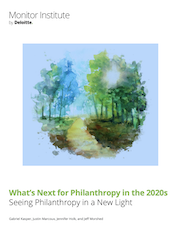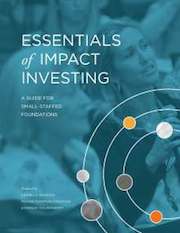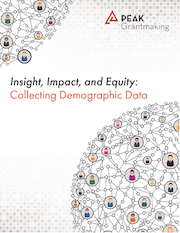Site Search
- resource provided by the Forum Network Knowledgebase.
Search Tip: Search with " " to find exact matches.
This toolkit is for seasoned donors, donor advised fund holders, foundation trustees, and staff who are taking steps to significantly ramp up the impact of their giving. No longer content with just “making good grants” or “doing good things for the community,” you have taken a fresh look at your goals, strategies, and outcomes and decided that you could do things differently to achieve even more.
We all know that setting bolder, bigger goals for impact is only step one. Implementing strategies and achieving these goals typically involves a winding path full of experiments, iterations, and obstacles. This toolkit is crafted to help seasoned funders anticipate common obstacles to high-impact philanthropy and learn about effective strategies to overcome them.

Reporting to the senior director, Impact Investments, the impact investment officer contributes to the development, implementation, and ongoing management of RWJF’s impact investing program to improve health and healthcare. Their primary responsibilities include identifying areas where debt, equity, and guarantees can further the Foundation’s programmatic objectives, underwriting and structuring investments and monitoring the financial and programmatic performance of investments over time. In addition, the impact investment officer maintains relationships externally with co-investors and represents the Foundation on panels and at conferences.

Seeking to increase their philanthropic impact, many engaged foundations are turning to impact investing. The reason is clear: The field and practice of impact investing have matured—structures are in place, best practices have emerged, and opportunities have multiplied—enabling more foundations to use this powerful tool. Yet entering unfamiliar terrain can be intimidating, and foundations with few or no staff face unique challenges even as they enjoy unique opportunities.
Essentials of Impact Investing: A Guide for Small-Staffed Foundations addresses those challenges and highlights those opportunities. The guide demystifies the process of designing and implementing an effective impact investing strategy, offering advice, tools, and real-world examples of impact investing by foundations with few or no staff.
The templates in this toolkit are designed to help your organization develop or refresh your intended impact and theory of change. They provide an overview of each step and worksheets that guide your team through critical considerations.
Impact 100 Garden State was thrilled to announce the three nonprofit recipients of $100,000 grants, based on member vote. All seven finalists will receive a $10,750 Merit Award. Every penny of our members' $1,000 membership contribution goes to grants to nonprofits.
Impact100 Essex announced that three Essex County nonprofits are the recipients of its 2023 Equity Grants: SHE Wins Inc., AAPI Montclair, and Keys 2 Success.
With over 170 members, Impact100 Essex is a collective philanthropic group founded and funded by women in Essex County. For the past three years, in response to research showing a discrepancy in funding to BIPOC-led nonprofit organizations, Impact100 Essex’s Equity Grants have provided unrestricted funds to small BIPOC-led nonprofits.
A'Dorian Murray-Thomas, Founder and Executive Director of SHE Wins Inc., a leadership initiative for girls in Newark, receiving a $15,000 grant, said, “We are honored to be a recipient of this Equity Grant. When you invest in the hearts and minds of young women today, you invest in a better tomorrow for us all.” While inclusive of all girls, SHE Wins Inc. primarily aims to serve girls affected by inner city violence.

Grantmakers occupy a powerful space of privilege in the social change sector. As such, they have a unique opportunity—and responsibility—to work proactively toward equity and inclusivity. Increasingly, grantmaking institutions are challenging themselves to live their values through their grantmaking practices.
For philanthropy to advance equity in all communities, especially low-income communities and communities of color, it needs to be able to understand the demographics of the organizations being funded (and declined), the people being served, and the communities impacted. That data should be used to assess practices and drive decision making.
PEAK Grantmaking is working to better understand and build the capacity of grantmakers for collecting and utilizing demographic data as part of their grantmaking.
PEAK Grantmaking is working to better understand and build the capacity of grantmakers for collecting and utilizing demographic data as part of their grantmaking. Their work is focused on answering four key questions:
- What demographic data are grantmakers collecting and why?
- How are they collecting these demographic data?
- How is demographic data being used and interpreted?
- How can funders use demographic data to inform their work?
With the help of Kelly Brown, former Executive Director of the D5 Coalition, and an advisory committee of grantmakers, PEAK has completed an expansive survey, interviews with grantmakers, and field research on these four questions.
What would good foundation practice with solid evaluative inquiry at its core look like? Find out how your foundation can rethink the role of evaluation and turn it into a vital institutional tool.
